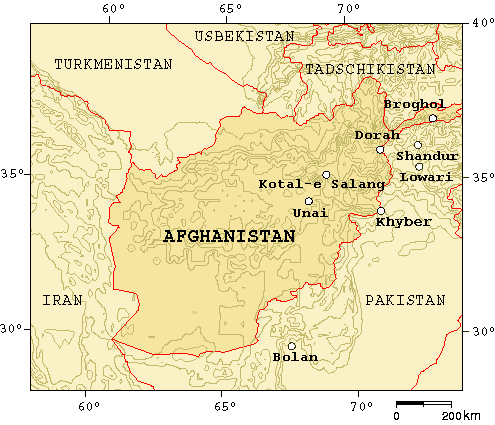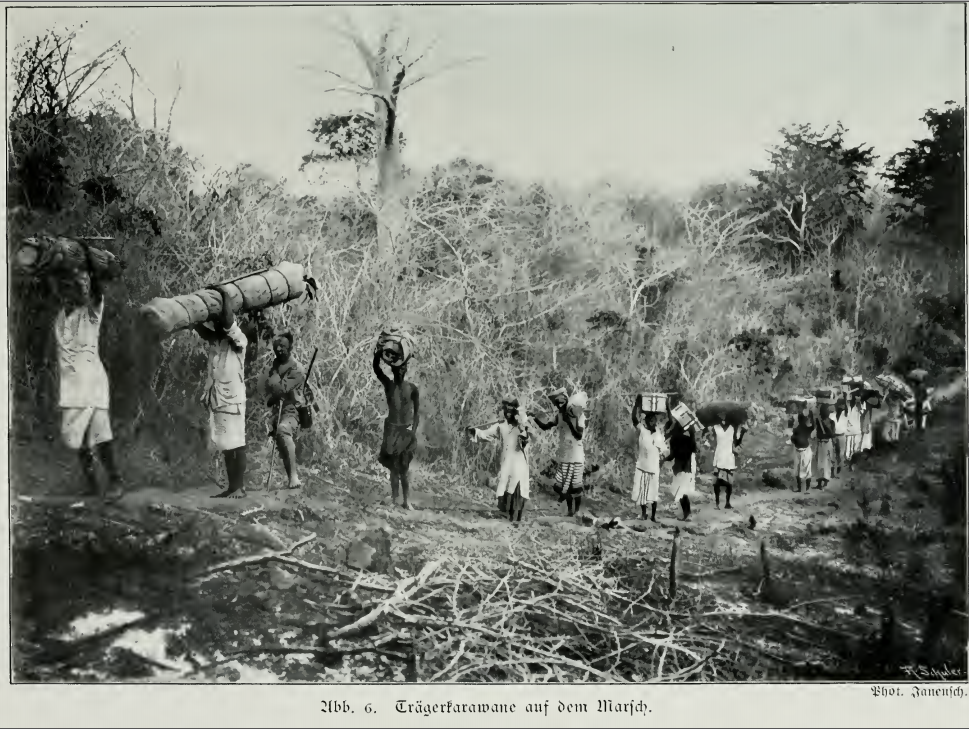|
Lowari Top
Lowari Pass ( ur, درہ لواری), or Lowari Top, (el. 10,230 ft.) is a high mountain pass that connects Chitral with Dir in Khyber-Pakhtunkhwa, Pakistan. Lowari Top is a relatively low pass, by far the lowest pass to enter Chitral, the rest all being 12,000 to 15,000 feet. Lowari Top is closed by snow from late November to late May every year. During this time, jeeps cannot cross so men must travel by foot. This is dangerous, as there are high mountains on each side of Lowari Top, and a deadly avalanche can come at any moment without warning. Every winter a few people are killed by avalanches while crossing Lowari Top. Their bodies are buried under the snow and it is only when the summer comes and the snow melts that their bodies are found and their fate learned. Nevertheless, Lowari Top remains popular because it is the shortest route from Chitral to Peshawar. The other way would be down the Kunar River to Jalalabad through hostile Afghan Territory or the much longe ... [...More Info...] [...Related Items...] OR: [Wikipedia] [Google] [Baidu] |
Lowari Tunnel
Lowari Tunnel ( ur, , ''Lowari Sarang'') is a vehicular tunnel under the Lowari Pass of the Hindu Kush mountains, between Dir and Chitral in Khyber Pakhtunkhwa province of Pakistan. It is operated by the National Highway Authority and carries traffic on the N-45 National Highway, thus bypassing Lowari Pass. Construction was partly completed by June 2017, By late 2018, the tunnel was open to vehicular traffic for at least ten hours per day. The total cost of the tunnel was . The tunnel is one of the longest tunnels in South Asia, and is the longest in Pakistan, superseding the Khojak Tunnel in 2018. History Originally conceived as a railway tunnel, construction began in September 1975 and was inaugurated by Prime Minister Zulfiqar Ali Bhutto. However, less than a year later work stopped in 1976 due to non allocation of funds. Construction resumed in September 2005, and the tunnel was initially expected to be completed by 2009; with conversion into a vehicle road tunnel. ... [...More Info...] [...Related Items...] OR: [Wikipedia] [Google] [Baidu] |
Gilgit
Gilgit (; Shina: ; ur, ) is the capital city of Gilgit–Baltistan, Pakistan. The city is located in a broad valley near the confluence of the Gilgit River and the Hunza River. It is a major tourist destination in Pakistan, serving as a hub for trekking and mountaineering expeditions in the Karakoram mountain range. Gilgit was once a major centre for Buddhism; it was an important stop on the ancient Silk Road, and today serves as a major junction along the Karakoram Highway with road connections to China as well as the Pakistani cities of Skardu, Chitral, Peshawar, and Islamabad. Currently, it serves as a frontier station for the local tribal areas. The city's economic activity is mainly focused on agriculture, with wheat, maize, and barley as the mainly-produced crops. Etymology The city's ancient name was ''Sargin'', later to be known as ''Gilit'', and it is still referred to as ''Gilit'' or ''Sargin-Gilit'' by the local people. The native Khowar and Wakhi-speaking ... [...More Info...] [...Related Items...] OR: [Wikipedia] [Google] [Baidu] |
John Keay
John Stanley Melville Keay FRGS is a British historian, journalist, radio presenter and lecturer specialising in popular histories of India, the Far East and China, often with a particular focus on their colonisation and exploration by European ethnic groups, Europeans. In particular, he is widely seen as a pre-eminent historian of British India. He is known both for stylistic flair and meticulous research into archival primary sources, including centuries-old unpublished sources. The author of some twenty-five books, he also writes regularly for a number of prominent publications in Britain and Asia. He began his career with ''The Economist''. He has received several major honours including the Sir Percy Sykes Memorial Medal. In 2019, he received an honorary doctorate, presented by Princess Anne, from the University of the Highlands and Islands in Scotland. ''The Economist'' has called him "a gifted non-academic historian", the ''Yorkshire Post'' has called him "one of our ... [...More Info...] [...Related Items...] OR: [Wikipedia] [Google] [Baidu] |
Wakhan Corridor
The Wakhan Corridor ( ps, واخان دهلېز, translit=wāxān dahléz, fa, دالان واخان, translit=dâlân vâxân) is a narrow strip of territory in Badakhshan Province of Afghanistan, extending to Xinjiang in China and separating the Gorno-Badakhshan Autonomous Region of Tajikistan from the Gilgit-Baltistan region of Pakistan-administered Kashmir.International Boundary Study of the Afghanistan–USSR Boundary (1983) by the US Pg. 7 [...More Info...] [...Related Items...] OR: [Wikipedia] [Google] [Baidu] |
Broghol
Broghil, also spelled Broghol, elevation , is a high mountain pass along the Durand Line border that crosses the Hindu Kush mountain range and connects Wakhan District of Badakhshan Province, Afghanistan with Chitral District of Khyber Pakhtunkhwa, Pakistan. History Broghil is a relatively low pass. It was closed for about three months each winter because of snow, but for much of the rest of the year it was passable even for cart traffic. It is one of the four major mountain passes entering Chitral District; the others are the Dorah Pass from Badakshan Province of Afghanistan, Shandur Top from Gilgit, and Lowari Top from Upper Dir District. The area of Broghil is inhabited by Wakhi and Kyrgyz people. European migration According to the National Geographic Genographic Project, Broghol Pass appears to be the route used by the ancestors of all modern Western Europeans to reach Europe. Modern Europeans carrying the M45 genetic marker crossed Broghol and then turned west; M45 f ... [...More Info...] [...Related Items...] OR: [Wikipedia] [Google] [Baidu] |
Badakshan
Badakhshan is a historical region comprising parts of modern-day north-eastern Afghanistan, eastern Tajikistan, and Taxkorgan Tajik Autonomous County in China. Badakhshan Province is one of the 34 provinces of Afghanistan. Much of historic Badakhshan lies within Tajikistan's Gorno-Badakhshan Autonomous Region, in the southeastern part of the country. The music of Badakhshan is an important part of the region's cultural heritage. Name The name "Badakhshan" ( fa, بدخشان, ''Badaxšân''; ps, بدخشان; tg, Бадахшон, ''Badaxşon''; ) is derived from the Sasanian official title ''bēdaxš'' or ''badaxš'', which may be from an earlier *pati-axša; the suffix -''ān'' indicates that the country belonged, or had been assigned as a fief, to a person holding the rank of a '' badaxš''. People Badakhshan has a diverse ethnolinguistic and religious community. Tajiks and Pamiris are the majority while a tiny minority of Kyrgyzs and Uzbeks also are found in their ... [...More Info...] [...Related Items...] OR: [Wikipedia] [Google] [Baidu] |
Dorah Pass
Dorah Pass, also called ''Durah Pass'', connects Badakshan Province of Afghanistan with Chitral District in Khyber Pakhtunkhwa, Pakistan. The Dorah Pass is more than high. It is located along the Durand Line border and crosses the Hindu Kush mountain range. Situated at the foot of the pass is Lake Dufferin, also known locally as Hawz-i Dorah. The lake is roughly long by over broad. Dorah Pass became important during the Soviet invasion of Afghanistan because the Soviets were unable to stop the flow of arms and men back and forth across the pass. Almost the entire Munji-speaking population of Afghanistan fled across the border to Chitral during the War in Afghanistan. Dorah Pass is situated in the Pamir, a high plateau sometimes called "The roof of the world" that joins Pakistan, Afghanistan, Tajikistan, and China. The Dorah Pass is one of the four major mountain passes that enter Chitral. The others are the Broghol Pass from the Wakhan District of Badakhshan, Afghanistan, Shan ... [...More Info...] [...Related Items...] OR: [Wikipedia] [Google] [Baidu] |
Porter (carrier)
A porter, also called a bearer, is a person who carries objects or cargo for others. The range of services conducted by porters is extensive, from shuttling luggage aboard a train (a railroad porter) to bearing heavy burdens at altitude in inclement weather on multi-month mountaineering expeditions. They can carry items on their backs (backpack) or on their heads. The word "porter" derives from the Latin ''portare'' (to carry). The use of humans to transport cargo dates to the ancient world, prior to domesticating animals and development of the wheel. Historically it remained prevalent in areas where slavery was permitted, and exists today where modern forms of mechanical conveyance are impractical or impossible, such as in mountainous terrain, or thick jungle or forest cover. Over time slavery diminished and technology advanced, but the role of porter for specialized transporting services remains strong in the 21st century. Examples include bellhops at hotels, redcaps at ... [...More Info...] [...Related Items...] OR: [Wikipedia] [Google] [Baidu] |
Khowar People
The Kho (, khw, ) or Chitrali people, are an Indo-Aryan ethnolinguistic group native to the Chitral and Ghizer Districts of Gilgit-Baltistan. They speak an Indo-Aryan language called Khowar. History The Kho people are likely descendants of those who migrated to their present location in Chitral from the south. In ancient times the Kho people practiced a faith akin to that observed by the Kalash today. In the 14th century, many of the Kho converted to Islam though some previous customs continue to persist. With respect to Islam, the Kho are primarily Hanafi Sunni Muslims although there exists a substantial population of Ismaili Muslims in the Upper Chitral region. Language The Kho people speak the Khowar language, which is an Indo-Aryan language of the Dardic subgroup. The ethnologists Karl Jettmar and Lennart Edelberg noted, with respect to the Khowar language, that: "Khowar, in many respects sthe most archaic of all modern Indian languages, retaining a great part o ... [...More Info...] [...Related Items...] OR: [Wikipedia] [Google] [Baidu] |
Chitral (princely State)
, status = Princely state in alliance with British India to 15 August 1947;Fully independent: 15 August 1947 – 6 October 1947 , official_languages = Persian (official, literary, and administrative language) Khowar (court, de facto language) , national_languages = , government_type = Monarchy , image_coat = Coat of arms of State of Chitral.svg , image_flag = Flag of State of Chitral.svg , flag_type = State flag , flag_border = no , capital = Chitral Town , year_start = 1320 , event1 = Raees dynasty , date_event1 = 1320 , event2 = Kator dynasty , date_event2 = 1571 , event3 = Subsidiary Alliance with British India , date_event3 = 1885 , event4 = Salute state , date_event4 = 1919 , event_end = Princely state of Pakistan , year_end ... [...More Info...] [...Related Items...] OR: [Wikipedia] [Google] [Baidu] |
Palula Language
Palula (also spelt Phalura, Palola, Phalulo) and also known as Ashreti (''Aćharêtâʹ'') or Dangarikwar (the name used by Khowar speakers), is an Indo-Aryan language spoken by approximately 10,000 people in the valleys of Ashret and Biori, as well as in the village of Puri (also Purigal) in the Shishi valley and at least by a portion of the population in the village Kalkatak, in the Chitral District of Khyber Pakhtunkhwa province of Pakistan. In some of the smaller villages, Palula has either ceased to be spoken (in the village Ghos, situated near Drosh) or its speakers are largely shifting (as in Puri and Kalkatak) to the more widely spoken Khowar language. However, in the main Palula settlements in the Biori and Ashret valleys, it is a strong, vibrant and growing language, as the population in those areas increases and it is still with a few exceptions the mother tongue of almost all people. Palula is pronounced as /paːluːlǎː/, with three long vowels and a rising pitch ... [...More Info...] [...Related Items...] OR: [Wikipedia] [Google] [Baidu] |
Ashret
Ashirate ( ur, اَشْريٹ), sometimes written Ashiret or Asherate, is a settlement and an administrative unit, known as a Union Council, of Chitral District in the Khyber Pakhtunkhwa province of Pakistan. It lies in the south of the district, on the road to the Lowarai Pass and Dir. The population speak the Palula language. See also * Chitral District Chitral District ( ur, ) was the largest district in the Khyber-Pakhtunkhwa province of Pakistan, covering an area of 14,850 km², before splitting into Upper Chitral District and Lower Chitral District in 2018. Part of the Malakand Div ... References External linksKhyber-Pakhtunkhwa Government website section on Lower Dir [...More Info...] [...Related Items...] OR: [Wikipedia] [Google] [Baidu] |


.jpg)



